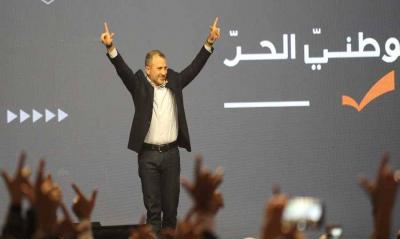The "Free Patriotic Movement," led by MP Gibran Bassil, positions itself halfway between maintaining its alliance with opposition forces by supporting the candidacy of former minister Jihad Azour for the presidency and its insistence on dialogue with "Hezbollah" in an attempt to convince them to adopt its demands for expanded administrative and financial decentralization and to launch a credit fund as a basis for later agreeing on a middle-ground presidential candidate.
Sources from "Asharq Al-Awsat" indicated that the "Free Patriotic Movement" resumed its communication with opposition forces, coinciding with the revival of its dialogue with "Hezbollah," which began by forming a joint committee tasked with reaching a formula concerning the legislation of expanded administrative and financial decentralization, along with legislation for the credit fund and agreeing on presidential priorities in the post-election phase.
The sources confirmed that the "Free Patriotic Movement" renewed its contact with opposition forces in a meeting held on Tuesday, attended by MP George Attallah and former MP Eddie Maalouf for the "Movement," and MPs Sami Gemayel, head of the "Kataeb" Party, and Elias Hankach from the opposition, along with MPs Ghassan Hasbani, George Okies, and Fadi Karam from the "Lebanese Forces," as well as MPs Michel Moawad and Adib Abdel-Massih from the "Renewal" bloc, and MPs Michel Doueihy and Mark Daou from the "Forces of Change."
The sources noted that the representatives of the "Free Patriotic Movement" reaffirmed their commitment to their alliance with the opposition in supporting Azour's candidacy and expressed their readiness to issue a statement in this regard to counter any contrary rumors. They highlighted that they inquired about the possibility of agreeing on an alternative candidate if Azour's election to the presidency became unachievable.
According to the same sources, the opposition's response was that it was too early to discuss an alternative candidate since it would be inappropriate to waste the opportunity of his candidacy without first waiting to clarify the situation as new data might emerge, similar to what led to the shift from Maawad's candidacy to Azour's. The opposition, while not closing the door on the possibility of agreeing on an alternative candidate, felt that waiting was wise to avoid premature conclusions.
The sources stated that the "Free Patriotic Movement" is inclined to respond to the call for dialogue from Speaker Nabih Berri but prefers to determine its final position based on its assessment of the reactions that have ranged from support to abstention.
While the opposition insists on rejecting Berri's call for dialogue, it has not demanded that the "Free Patriotic Movement" align with its stance, allowing it the freedom to make its decision. It was revealed that the revival of dialogue between the "Free Patriotic Movement" and "Hezbollah" was significantly present at the meeting table.
The opposition listened to the "Movement’s" perspective regarding its eagerness for dialogue with its ally, as it seeks the support of "Hezbollah" for its demands on the approval of expanded administrative and financial decentralization and the legislation of the credit fund, alongside an agreement on presidential priorities after the next president is elected.
The representatives of the “Free Patriotic Movement” stated that reaching an agreement with the party on the points outlined in their political paper, submitted to "Hezbollah" official Wafiq Safa, which was pivotal in resuming dialogue after a gap of more than ten months, is expected to lead to their legalization in legislation issued by parliament in a session held before the president's election.
From the opposition's perspective, it appears to be gaining traction that while the "Free Patriotic Movement" insists on dialogue with "Hezbollah," it is cautious in passing judgment on its ally's reactions.
The opposition raised the issue with the "Free Patriotic Movement" about abstaining from attending parliamentary sessions for urgent legislation and not providing political cover for cabinet sessions. They indicated that they requested a special exemption that would allow them not to boycott urgent legislative sessions provided they are dedicated to enacting laws for expanded administrative and financial decentralization, launching the credit fund, and issuing specific regulatory decrees.
The sources confirmed that the opposition expressed understanding of the "Free Patriotic Movement's" position regarding not objecting to urgent legislative sessions, provided that they focus solely on passing the laws it demands without additions or omissions, as merely including other issues on the agenda would extend the presidential vacancy rather than exerting pressure to elect a president sooner rather than later.
Furthermore, it confirmed that the "Free Patriotic Movement" did not link "Hezbollah’s" approval of its demands to a pivot towards supporting former MP Suleiman Frangieh for the presidency. The sources quoted its representatives in the meeting as stating that the party's responsiveness opens the door for agreement on a middle-ground candidate.
The remaining question is, what does MP Gibran Bassil, the head of the "Free Patriotic Movement," rely on? Does he believe that "Hezbollah" will fulfill his desire to legalize what he presented in his political paper before the presidential election and, secondly, without committing to supporting Frangieh?




